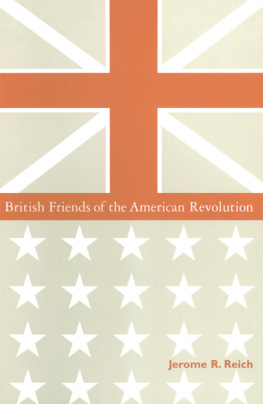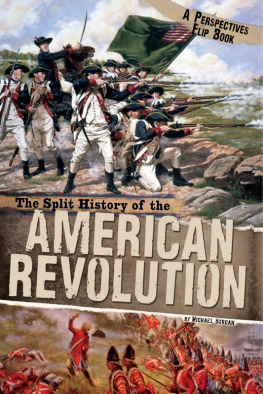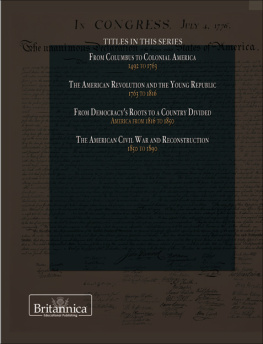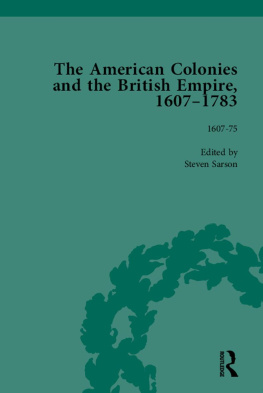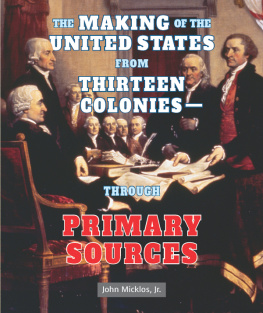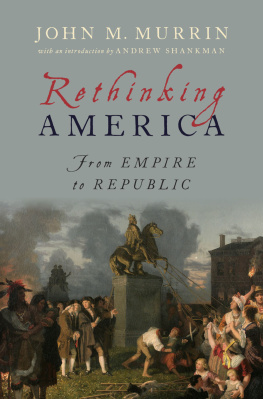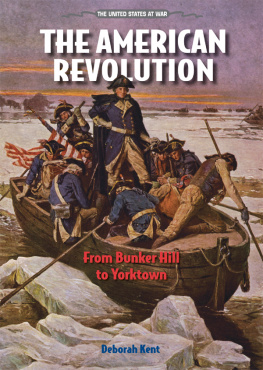Jerome R. Reich - British Friends of the American Revolution
Here you can read online Jerome R. Reich - British Friends of the American Revolution full text of the book (entire story) in english for free. Download pdf and epub, get meaning, cover and reviews about this ebook. year: 1997, publisher: Routledge, genre: Politics. Description of the work, (preface) as well as reviews are available. Best literature library LitArk.com created for fans of good reading and offers a wide selection of genres:
Romance novel
Science fiction
Adventure
Detective
Science
History
Home and family
Prose
Art
Politics
Computer
Non-fiction
Religion
Business
Children
Humor
Choose a favorite category and find really read worthwhile books. Enjoy immersion in the world of imagination, feel the emotions of the characters or learn something new for yourself, make an fascinating discovery.
- Book:British Friends of the American Revolution
- Author:
- Publisher:Routledge
- Genre:
- Year:1997
- Rating:5 / 5
- Favourites:Add to favourites
- Your mark:
- 100
- 1
- 2
- 3
- 4
- 5
British Friends of the American Revolution: summary, description and annotation
We offer to read an annotation, description, summary or preface (depends on what the author of the book "British Friends of the American Revolution" wrote himself). If you haven't found the necessary information about the book — write in the comments, we will try to find it.
British Friends of the American Revolution — read online for free the complete book (whole text) full work
Below is the text of the book, divided by pages. System saving the place of the last page read, allows you to conveniently read the book "British Friends of the American Revolution" online for free, without having to search again every time where you left off. Put a bookmark, and you can go to the page where you finished reading at any time.
Font size:
Interval:
Bookmark:
British Friends of the American Revolution
First published 1998 by M.E. Sharpe
Published 2015 by Routledge
2 Park Square, Milton Park, Abingdon, Oxon OX14 4RN
711 Third Avenue, New York, NY, 10017, USA
Routledge is an imprint of the Taylor & Francis Group, an informa business
Copyright 1998, Taylor & Francis. All rights reserved.
No part of this book may be reprinted or reproduced or utilised in any form or by any electronic, mechanical, or other means, now known or hereafter invented, including photocopying and recording, or in any information storage or retrieval system, without permission in writing from the publishers.
Notices
No responsibility is assumed by the publisher for any injury and/or damage to persons or property as a matter of products liability, negligence or otherwise, or from any use of operation of any methods, products, instructions or ideas contained in the material herein.
Practitioners and researchers must always rely on their own experience and knowledge in evaluating and using any information, methods, compounds, or experiments described herein. In using such information or methods they should be mindful of their own safety and the safety of others, including parties for whom they have a professional responsibility.
Product or corporate names may be trademarks or registered trademarks, and are used only for identification and explanation without intent to infringe.
Library of Congress Cataloging-in-Publication Data
Reich, Jerome R.
British friends of the American Revolution / Jerome R. Reich
p. cm.
Includes bibliographical references (p. ) and index.
ISBN 0-7656-0073-0( hardcover: alk. paper).ISBN 0-7656-0074-9 (pbk. : alk. paper
1. United StatesHistoryRevolution, 1775-1783Influence.
2. United StatesHistoryRevolution1, 1775-1783Foreign public opinion, British.
3. Public OpinionGreat BritainHistory18th century. I. Title.
E209.R35 1997
973.3dc21
97-14520
CIP
ISBN 13: 9780765600745(pbk)
ISBN 13: 9780765600738(h bk)
To my son Michael whose commitment and insight have been indispensable at all stages in the production of this volume.
British Friends of the American Revolution
Let our patriots [italics mine] therefore, if they would arrive at eminence by their conduct, go over to America, and demand the confidence of the colonies. They may have real merit to plead there in their attempts to overthrow the Constitution of Great Britain; they may have merit there by endeavoring to render the impudent resolutions of a provincial committee, superior to our lawful ordinances. But here, my lords, I trust they will ever be held contemptible, that their characters will be as mean, as their proceedings have been flagitious, and that their machinations to destroy the importance of the British empire, will always make them detestable to every good Englishman.
Against whom was this diatribe, delivered by the earl of Hillsborough in the House of Lords on May 18, 1770, directed? Who were these villainous individuals, ironically termed patriots by the secretary of state for America? As this volume will indicate, they included, among others, William Pitt, the Great Commoner, the most popular statesman of his time; that devil (as King George III termed him) John Wilkes, the key person in the radical reform movement, as well as Reverend John Horne Tooke, his rival in the same movement; Dr. Richard Price, a distinguished dissenting clergyman with a mathematical bent; two old enemies who joined together as leaders of the Whig party, the earnest and eloquent Edmund Burke and the rakish descendant of King Charles II, Charles James Fox; one of the few true colonial experts, former governor of Massachusetts Thomas Pownall; James Burgh, a schoolmaster-turned-political-reformer; a sensation in her time, republican historian Catherine Macauley; David Hartley, a distinguished scientist who meddled in politics; John Cartwright, a naval officer who felt that the British empire had grown unwieldy and corrupt; and Josiah Tucker, an Anglican dean who was economically sophisticated enough to realize that Great Britain would actually benefit if it granted the North American colonies their independence; and the duke of Richmond, whose efforts on behalf of America and parliamentary reform earned him the sobriquet, the Radical Duke.
What did this diverse group of individuals have in common to draw down upon themselves the ire of Lord Hillsborough? Very little, except that for disparate, sometimes even contradictory motives and utilizing varying techniques, they opposed the policy of the British government toward its Thirteen Colonies.
Our understanding of these British Friends of the American Revolution will be enhanced by a brief survey of political developments in eigh-teenth-century Great Britain and America. During the reigns of the first two Georges (17141760), the Whig Party dominated the British government. The Whigs were not a party in the modern sense of the term. They were a conglomeration of competing factions each led by a nobleman. Years of power brought about a significant change in Whig political thinking. No longer did they accept the Lockean theories of natural rights and the contractual origin of government, which they had espoused during the Glorious Revolution of 1688. Well before the accession of George III, they had come to believe in a conservative doctrine that posited a balanced government of King, Lords, and Commons. In practice, however, sovereignty rested in Parliament or, in other words, in themselvesthe landed aristocracy that dominated both Houses of Parliament. A corollary of this belief was that sovereignty was indivisible and thus Parliament had unlimited power to legislate for the British colonies as well as the home country.
Not all Whigs accepted these new doctrines. A small minority called themselves Real Whigs or Commonwealthmen (because many of their ideas dated back to the period 16491660).ranks. This often uneasy coalition provided the most consistent and zealous supporters of the American point of view. This should come as no surprise because the leaders of the American cause were themselves Real Whigs (though they did not use the adjective).
This is clearly illustrated by the statements made in two court cases that took place in the colonies even before serious problems arose between Great Britain and its American colonies. According to John Adamss contemporary notes, in 1761, in a losing court battle against writs of assistance (general search warrants), James Otis declared, As to Acts of Parliament, an Act against the Constitution is void; an Act against natural equity is void. But the gulf in political outlook between Great Britain and the colonies was even deeper than these quotations indicate.
The Glorious Revolution also exerted significant influence on colonial political practice and theory. Americans assumed that the Revolution had won for the individual colonial assemblies all the rights gained by the English House of Commons and, conversely, that the English Parliament had no power over the colonies except in the area of imperial affairs. In spite of the opposition of the British government, by 1763 the first assumption had been largely realized: Members of the colonial assemblies had the right of freedom of discussion on the floor of the legislature; they were immune from arrest while the legislature was in session; they could make their own rules, settle disputed elections, and elect their own speaker; and finally, they won the exclusive right to initiate money bills and to oversee the expenditure of public funds. Only the governors power to veto (and the Privy Councils to disallow) acts of the colonial legislature and the governors power to prorogue or dissolve it differed from English practice, in which the king no longer exercised these powers over Parliament.
Next pageFont size:
Interval:
Bookmark:
Similar books «British Friends of the American Revolution»
Look at similar books to British Friends of the American Revolution. We have selected literature similar in name and meaning in the hope of providing readers with more options to find new, interesting, not yet read works.
Discussion, reviews of the book British Friends of the American Revolution and just readers' own opinions. Leave your comments, write what you think about the work, its meaning or the main characters. Specify what exactly you liked and what you didn't like, and why you think so.

